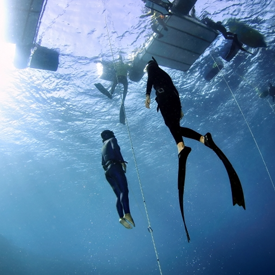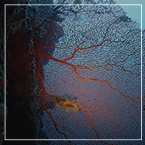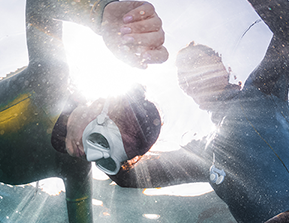Silent Diving… It Puts A Different Perspective On Things

THE BENEFITS OF FREEDIVING WITH RAID RAID is putting a lot of effort and a focus on Freediving programs this year. Why is that? We asked our Freediving SME (subject matter expert) to explain why freediving is important to her and why it’s a benefit for anyone who dives as well as anyone specifically interested in moving into that branch of our sport. “As both a scuba and freedive instructor, I’ve taught a lot of people over the years, including teaching qualified scuba divers to freedive. There are some huge benefits to be gained by taking a freediving course. As a scuba diver, you will already have a pretty good handle on your buoyancy, and the feelings associated with being underwater. Learning to freedive can give you a better understanding of breath control, better equalisation skills, improved buoyancy, improved body awareness and more confidence in the water. This can make you into a more relaxed and efficient scuba diver, with better air consumption, meaning you can dive for longer.” Pash Baker is also an underwater photographer, and one of the things she loves about freediving is the ability to have incredible animal encounters that are simply not possible on scuba. “I’ve had baby humpbacks swim over to check me out and then stay and play a while. I’ve freedived with blue whales, had a one-on-one encounter with an Oceanic White Tip shark on breath hold and many other amazing experiences. The images I take while freediving are very emotive for me, as they are attached to memories of phenomenal encounters.” So, with all that in mind, we hope the agency’s recent focus on freediving begins to make sense and that this month… and onwards… you think seriously about expanding your personal experience to include breath-hold, no-tank diving with RAID. And above all the benefits that Pash mentions, it’s fun! VIEW FREEDIVING PROGRAMS HERE>>>
What exactly is a dive agency…

AND WHAT DO THEY SELL? You could be a certified diver with a couple of dozen logged dives, or even have years of experience diving tonnes of exotic spots around the globe, but the chances are that if your great aunt Mildred — the nice one from Brighton — asked you to explain what a dive agency is — what it does: and what exactly it sells — you might not be comfortable answering. Well, you might be happy to answer initially but later you’d feel guilty when you realised you’d supplied her a dodgy answer. Don’t fret, there are a few people who actually work full-time in the dive industry who’d have trouble responding intelligently to that one! The most obvious mistake that folks make, including great aunt Mildred and a lot of people like her, is thinking that a dive agency ‘does’ diver training. They do not. When a student signs up to become a diver, the scuba instructor, the man or woman who’s going to teach them, doesn’t work for the agency. Dive agencies do a few things but teaching is not one of them. That’s the job of dive instructors, and they are employed by local dive shops or dive resorts, and not the dive agency. A dive agency is more like a sort of lending library or publishing company. They sell books. Books about diving. Mostly. (We’ll get into the nuances a few paragraphs down.) But essentially, dive agencies pay “subject matter experts” to write books about all things related to diving, and then they charge a fee for people to read them. Some agencies actually sell printed books… really old-school. However, most sell eBooks. So, their library is virtual rather than some sunny alcove in a vast book-lined athenaeum with potted aspidistras, overstuffed leather chairs, and side tables supporting cups of tea and dainty plates of cucumber sandwiches with the crusts cut off. It follows then that dive agencies make their money primarily from selling library access to the dive professionals who actually do the teaching. Occasionally they may sell directly to student divers, but most of the time an agency’s primary customers are dive pros. It’s important to understand these ‘reading’ fees are modest. eBooks are inexpensive, and in fact represent a small fraction of the cost of a diving course. For instance, an agency makes fewer than $30 from a typical open water class regardless of what the student pays to take the class. The agency fees for a more advanced course, let’s say on a rebreather, nets an agency a little more, perhaps $100, but that is still a fraction of the total cost of learning to dive a rebreather. The bulk of the money, and in fairness, the bulk of the work goes to the shop or instructor. For example, an experienced CCR instructor would charge a student more than $1500-plus for a course that would take a week to deliver. Big difference. But it’s not all pennies and pocket lint for an agency. Firstly, there are obvious economies of scale. A dive shop or instructor certifying 200 basic students a year could be doing very well, but one of the so-called Big Seven agencies will issue thousands and thousands of this type of diver certs every year. And there are other “products and services” that an agency sells. Dive agencies, and there are dozens of them around the world, also police the way diver training is delivered. And this, indirectly, is what makes them money. Dive agencies charge its members — instructors and dive centres — money to be part of their business network. This includes marketing and promotion, but the main ‘product’ is the assurance and protection that comes from those ‘policing’ duties. An intangible but a vitally important one. The way each agency administers this responsibility varies a lot from agency to agency. Some are more strict and on the ball than others. But a common thread is they each publish standards — detailed outlines, a framework — that instructors are required to follow when they are teaching students. These standards make it clear, how to teach, what to teach, how to maintain control, and give tips on how to prevent things going pear-shaped. And it’s the agency’s standards that must be met in order for a student diver to be “certified.” You sometimes hear people refer to diver certifications as a dive licence but a diver certification isn’t really a licence. Not in the legal sense of the word. It just tells whomever is interested that the diver has completed such-and-such course and satisfied the course’s published standards. Certifications, certainly those from the major agencies, are recognized by dive operations globally. And a certification card — digital or physical — is required to rent dive gear, buy a gas fill, get onto a dive boat, have access to a dive site. So, dive instructors and dive operators pay fees to an agency to plug into those standards. Most agencies charge dive instructors an annual subscription — usually a few hundred dollars — to be a member. RAID is unique in that it offers its professional members Zero FEe-Membership. As long as they stay active and certify a handful of students each year, membership fees are waived. We still offer full support to our members, and our students, but RAID’s cost of doing business is kept low — our shareholders are divers not venture capitalists — and we serve a growing market. So, what to tell great aunt Mildred? Unless you enjoy watching someone’s eyes glace over, the suggestion is to tell her that dive agencies are in business to keep divers safe, active, and happy. You know a little more than that now, but the best message is that simple one. WHAT MAKES RAID TICK>>> CROSSING OVER TO RAID>>> THIS IS A BUSINESS OF DIVING MESSAGE FROM DIVE RAID INTERNATIONAL… FEEDBACK>>>
WHY RAID

REASON #112 Our focus is on developing relaxed, skillful divers… from day one.
Be The Best You Can Be
RAID PERFORMANCE DIVER This excellent RAID program has been a popular choice for divers since it was first introduced. It’s value as a serious refresher program for any level of diver (recreational or technical, open or closed circuit) has always been recognized, but it is particularly popular with experienced divers who have come up through other agencies, and who feel their skills and understanding of advanced dive protocols is a little “rusty” or lacking. We feel the Performance Diver course is unique approach to making better divers. However, that’s a common selling point… making you a better diver is part of the pitch from every dive agency and dive shop. But what exactly does it mean… what’s the real benefit? RAID’s programs focus on teaching real-world diving skills. Skills that make divers feel confident and comfortable in the water. Not only does that result in safer divers, but it’s an easy transition from that to more active divers… people who dive because it’s fun and they like it. The skills taught in this course have been designed by some of the most respected dive professionals in the industry. They have condensed years of in-water experience into a great program that’s fuelled by great ideas and solid knowledge. Something useful in all sorts of conditions and all sorts of gear configurations. In short, a range of skills you will use on every dive: buoyancy, trim, situational awareness, gear selection and management, contingency planning… having fun and staying safe. No matter how well you dive now, Performance Diver will make you even better. The applications of the program are endless. Any dive in any environment or equipment design can be made safer, easier, and more fun by utilizing the skills mastered in this course. SIGN UP TODAY >>> HERE
OTS FFM
The OTS Full Face Mask (FFM) Program is a totally new RAID training course. Following our early unit-specific FFM program, this new offering teaches everything a diver (or instructor) needs to know to safey use the OTS Guardian and Spectrum FFMs. It provides detailed modules on the advantages of using a full face mask, including environmental protection, improved physiological comfort, and enhanced communication capabilities. The anatomy, setup, inspection, donning, adjustment, emergency procedures, post-dive care, maintenance, and communication techniques specific to using the OTS Guardian and Spectrum FFMs are included. The program is open to divers who are at least 15 years old and certified as an Open Water 20 diver or equivalent. Minors need guardian permission to participate. The purpose of the agency’s approach to Full Face Mask programs is to equip participants with the necessary knowledge and abilities for safe open water diving using the OTS Full Face Mask. The program covers various conditions, environments, and depths in accordance with the participant’s training, experience, and the specifications of the specific equipment manufacturer. The certification obtained through this program is unit-specific, meaning it enables divers to safely and efficiently conduct dives using an OTS Full Face Mask within the limits of their core level certifications. Other FFM units are supported through other RAID programs. The maximum training depth for confined water training dives is 6 meters/20 feet, and for open water training dives, it is 20 meters/66 feet. All training must be conducted by a RAID Ocean Reef or OTS full face mask instructor, with a certified assistant who is also a full face mask diver present. Contact your local RAID dive centre for more details.
WHY RAID

REASON #127 Sometimes people ask why we teach open water students not to kneel on the bottom. The answer is stunning.
Dynamic Apnea adds another dimension to breathhold
RAID ADDS ANOTHER JEWEL IN ITS ONE-BREATH COURSE LINE-UP We are pleased to announce the launch of our Dynamic Apnea program, following the recent introduction of our Static Apnea program. This new offering further expands our range of training opportunities for freediving enthusiasts, and we are excited about the possibilities it presents for divers looking to enhance their skills and experiences in the world of apnea diving. Dynamic Apnea training is a type of breath-hold training that focuses on improving a person’s ability to hold their breath while moving underwater, typically used in freediving and swimming disciplines. At its fundamental level, it involves swimming underwater for a distance or time without taking a breath. Dynamic Apnea training can help enhance breath-holding capacity, increase lung efficiency, and improve overall performance in all water-based activities including scuba diving. Description: The RAID Dynamic Apnea Specialty course is a comprehensive training program designed to provide freedivers with the skills and knowledge necessary to excel in dynamic apnea swims. The course focuses specifically on dynamic apnea with bi-fins (DYNB) and dynamic apnea no fins (DNF). Participants will learn proper techniques, including buoyancy control, streamlining, and finning techniques. The course also covers important safety considerations, such as recognizing signs of hypoxia and performing rescue techniques. Additionally, the course emphasizes the importance of relaxation and mental focus, as well as the buddy system for supervision and support. Overall, the RAID Dynamic Apnea Specialty course offers divers the opportunity to improve their technique, enhance their performance, and enjoy the thrill of dynamic apnea. In freediving, Dynamic Apnea is a discipline where divers aim to cover the greatest horizontal distance underwater in a pool on a single breath, using fins for propulsion. This discipline requires both physical fitness and excellent breath-holding techniques. Divers streamline their bodies to minimize water resistance, use efficient finning techniques, and focus on relaxation and mental control to conserve oxygen and increase their distance. Dynamic Apnea training helps improve oxygen efficiency, lung capacity, and breath-holding ability, ultimately enhancing performance and safety during freediving activities. As with any activity in RAID’s curriculum, it’s important to practice Dynamic Apnea under the guidance of experienced instructors to ensure safety and proper technique. Dynamic Apnea at its highest level is a sport of records. The farthest freediving dynamic apnea with fins (male) is 301 metres, achieved by Guillaume Bourdila (France) at the 28th AIDA World Championship in Burgas, Bulgaria, on 24 June 2022. Bourdila surpassed the existing AIDA record of 300 metres, which had stood since 2016. Magdalena Solich-Talanda set a new DYN woman’s world record of 277 metres during a freediving competition in the Czech Republic, also in 2022. ASK YOUR LOCAL RAID DIVE CENTRE FOR MORE DETAILS>>>
Which brand is your choice?

FOR THE PROFESSIONAL, IT ALL DEPENDS ON WHAT WORKS FOR THEM Some choices simply seem odd to those of us looking at the world from a different vantage point. For example, I have never developed a taste for the ubiquitous Canadian morning eye-opener, a “double-double” from Tim Horton’s. For those readers unfamiliar with the Tim’s franchise — a nationwide operation — a “double-double” is a large coffee with two shots of cream and two spoons of sugar. And although I understand that denouncing Tim Horton’s coffee in a public forum, puts my Canadian citizenship in jeopardy, I can’t drink it… not even one mouthful. Sorry, Canada (and many franchises operating in a handful of North-eastern states), I find it awful. It isn’t to my taste. Obviously, since Tim’s is popular enough to be the brand of choice for Canadians from sea to sea to sea, there are more than a few people who’d disagree and I expect to get messages to that effect any day now! But isn’t it great to have freedom of choice? What brought this to mind is an active thread posted on an online dive industry job market. Someone posted a “my-coffee-is-better-than-your-coffee” type of message. Of course, they were comparing certifying agencies and not coffee shops, but the intent and audience reaction were about the same. Very few people agree on which of the roughly 120 dive agencies in the world, really is the best. No problem identifying the biggest, but biggest is not the best. At least not for everyone. The argument that a single option is fine, the status quo is king, and universal brand recognition trumps everything, is… well… a bandwagon fallacy. It’s the same as saying that because Tim Horton’s coffee is the most popular in Canada, ergo, it must be the best. It ain’t! I wouldn’t even try to guess the reasons why a dive shop owner on Vancouver Island, British Columbia, chooses to certify through XYZ agency, while his sister, an instructor in Come By Chance, Newfoundland, prefers to work with ABC. That’s entirely up to them. As long as they understand that what makes sense to them, may not work for the shop down the street or one situated on the opposite coast. And in fairness, they have to accept that choice is good. It’s what keeps the industry vibrant. Without choice, standards, teaching methods, the way we adapt to new technology would become stagnant. That would be a disaster. Change and innovation are good. And I think it’s much harder for the established brand leader to try different things than it is for a smaller operation with more of a ‘bespoke’ approach. But, that’s just an opinion. When I lived in Maine, I bought a bumper sticker from a beautiful little coffee shop in a nearby college town, which read: “Friends don’t let friends drink Starbucks.” I have to bite my tongue sometimes, because I feel the same way about teaching for one or two of the major players in the dive industry. Truth is, I have strong views on the subject, but of course, I’m biased… and in the final draft, making a poor choice is anyone’s prerogative. I believe instead, it’s best to work to bring positive CHANGE to the dive industry, but respect another’s choice to stick… well, to stick in the mud. And if you ever find yourself driving through Toronto’s Little Italy district, there’s this little cafe… – Steve Lewis – #TheRAIDWay™
Risk Management

THERE’S MORE TO IT THAN ASSIGNING BLAME… Playing around water is risky. It really makes very little difference whether the game is freediving, recreational diving on a shallow reef, or navigating through the twisted remains of a battleship sitting in the dark at 80 metres. It can be dangerous, and if something goes wrong, it’s human nature to look for someone to blame. However, assigning blame is very different to actually fixing the problem. In fact, blaming ‘some clown’ for an accident or a near miss is as far away from fixing a issue as one can get. The goal of every RAID instructor regardless of what they teach, is fixing problems. In fact, the goal should be to manage the risk before a problem shows its ugly head. Here are some simple steps to help make that happen. Unfortunately, we can never eliminate all risk from diving. Slippery poolsides, trips over an equipment bag left in a gangway, cylinders falling off a bench, the consequences of dehydration, bumping into firecoral or the sharp edges of a shipwreck’s hull: we cannot take them away. All we can do, as divers or instructors, is work at making the risks associated with this wonderful adventure, acceptable. And that’s what risk management is all about. #Theraidway™ MANY THANKS TO MHA CONSULTING FOR THE EXCELLENT GRAPHIC https://www.mha-it.com/AND KUDOS TO PASH BAKER FOR THE ORIGINAL IDEA FOR THIS POST
It’ll take your breath away

RAID STATIC APNEA PROGRAM We are thrilled to announce the launch of our innovative Static Apnea Program. This groundbreaking initiative represents a significant development in our offerings, and we have high hopes for its success and impact within the diving community. This specialty program can be taught by all active RAID Freediving Pool Instructor. (This program is restricted to activity in pool or pool-like conditions.) It is the ultimate guide for anyone looking to master the mentally demanding discipline of static breath-holding in freediving. Whether a student is a beginner or an experienced freediver, this comprehensive manual provides step-by-step instructions, expert tips, and detailed tables to help them increase their breath hold time and achieve a personal best. Learn relaxation techniques, visualization strategies, and the important role of a buddy in static apnea. With this manual, students will gain the knowledge and confidence to excel in static apnea and take freediving skills to new depths. Static apnea, what most of us would call ‘structured breath holding,’ is practiced for various reasons besides being an essential part of freediver development. These include health benefits for all water enthusiasts including scuba and rebreather divers! Some potential benefits of static apnea for health include: In addition, unlike other RAID diving activities, static apnea is a Competitive Sport where participants compete to hold their breath for the longest time possible. This adds an element of excitement and motivation for those interested in pushing their limits and setting records.And of course, static apnea training is one of the central principles of freediving, and during the coming months, RAID will be boosting its freediving program. The launch of this completely new, totally revamped, recreated static apnea program is one of the first steps. Static apnea for scuba divers Static apnea, or breath-holding, can be particularly beneficial for scuba divers as it helps improve breath control, lung capacity, and overall comfort in the water. Here are some specific benefits of static apnea for scuba divers: Increase in breath-holding time: By training in static apnea, scuba divers can improve their ability to hold their breath, which can be advantageous when diving underwater for extended periods. Enhanced relaxation: Practicing static apnea techniques can help divers stay calm and relaxed underwater, which is crucial for conserving energy and avoiding panic while scuba diving. Improved lung capacity: Static apnea training can expand lung capacity, allowing divers to take deeper and more efficient breaths, which can be beneficial for buoyancy control and overall comfort while diving. Better equalization: Breath-holding exercises can help divers improve their ability to equalize pressure in their ears and sinuses, reducing the risk of discomfort or injury during descents. It’s essential for scuba divers who practice static apnea to know the guidelines, and safely and gradually increase breath-holding times to avoid hypoxia or other risks associated with breath-holding exercises. Additionally, divers should always dive within their limits and be aware of safe diving practices. So, this course is a must-have. Overall, static apnea combines physical endurance, mental focus, relaxation, and competitive spirit, making it a unique and cool activity for those interested in breath control and challenging themselves. ASK YOUR LOCAL RAID DIVE CENTRE FOR DETAILS>>>

